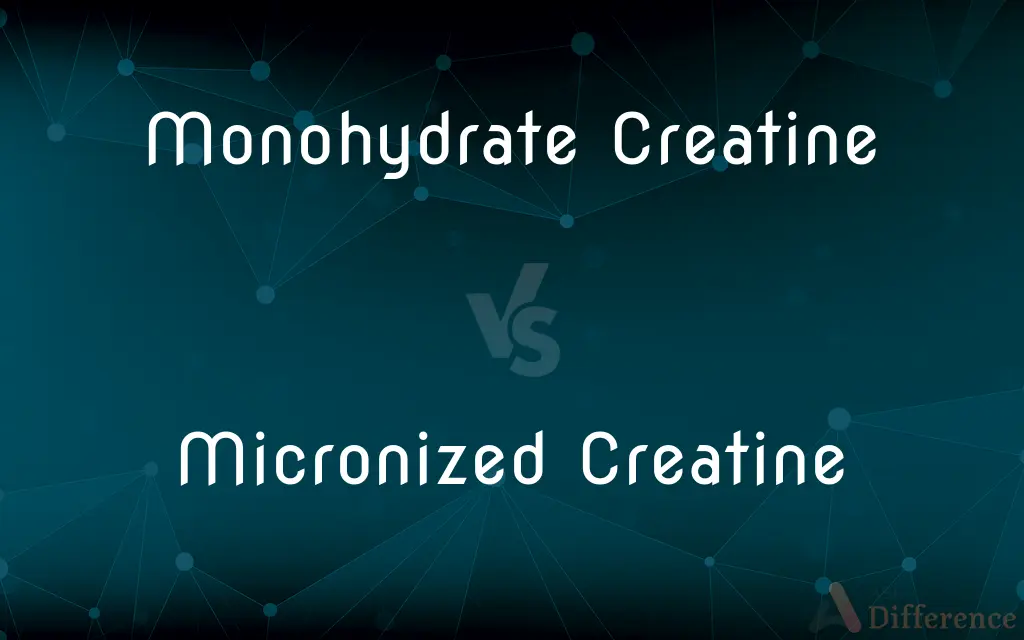Monohydrate Creatine vs. Micronized Creatine — What's the Difference?
By Tayyaba Rehman & Maham Liaqat — Published on February 24, 2024
Monohydrate Creatine is the traditional form used for muscle energy, while Micronized Creatine is finely ground for better solubility and absorption.

Difference Between Monohydrate Creatine and Micronized Creatine
Table of Contents
ADVERTISEMENT
Key Differences
Monohydrate Creatine is well-researched for its effectiveness in improving strength and muscle mass. It's a staple supplement for athletes and bodybuilders. Micronized Creatine, on the other hand, is the same molecule but processed to create smaller particles. This refinement aims to enhance its mixability in liquids and potentially improve its absorption in the body.
Both forms serve the same primary purpose of replenishing ATP stores in muscles, while enhancing performance, and aiding recovery, their physical properties differ due to the micronization process. Users often report that micronized creatine is easier to dissolve and less gritty than its monohydrate counterpart, possibly leading to a more pleasant consumption experience.
However, in terms of efficacy, scientific studies generally show no significant difference between the two forms regarding muscle creatine saturation over time. This suggests that the choice between them may come down to personal preference regarding texture and mixability.
Some users believe micronized creatine may lead to fewer digestive issues, such as bloating and cramping, although evidence is anecdotal. It's important for individuals to consider their own digestive sensitivity when choosing between these supplements.
Cost can be a differentiating factor; micronized creatine is often slightly more expensive due to the additional processing involved. Budget-conscious consumers may prefer monohydrate for its value and proven track record.
ADVERTISEMENT
Comparison Chart
Particle Size
Larger, can be gritty
Smaller, more refined
Solubility
Less soluble in water
Higher solubility
Absorption
Standard absorption rate
Potentially enhanced absorption
Digestive Comfort
May cause bloating in some
Often reported to cause less bloating
Cost
Generally more cost-effective
Slightly more expensive due to processing
Compare with Definitions
Monohydrate Creatine
Can have a gritty texture when mixed.
Some people find monohydrate creatine gritty, but it's worth it for the gains.
Micronized Creatine
Designed for easier digestion and absorption.
Micronized creatine is my go-to for quick absorption with no stomach upset.
Monohydrate Creatine
A popular supplement for increasing muscle mass and strength.
Many athletes add monohydrate creatine to their shakes for its performance-enhancing benefits.
Micronized Creatine
A finer powder form of creatine for better solubility.
Micronized creatine mixes well into water, leaving no residue.
Monohydrate Creatine
Cost-effective supplement option.
For budget-minded athletes, monohydrate creatine offers great value.
Micronized Creatine
May reduce potential for digestive issues.
Switching to micronized creatine eliminated the bloating I got from other forms.
Monohydrate Creatine
May cause water retention in muscles.
Monohydrate creatine leads to water retention, making muscles appear fuller.
Micronized Creatine
Offers the same benefits as monohydrate in a finer form.
Micronized creatine provides all the muscle-building benefits without the grit.
Monohydrate Creatine
Known for its simplicity and effectiveness.
Despite new variants, monohydrate creatine remains the gold standard in sports supplementation.
Micronized Creatine
Slightly more expensive due to processing.
The micronization process adds to the cost, but the solubility of micronized creatine is worth it.
Common Curiosities
What is the main difference between monohydrate and micronized creatine?
The main difference is particle size, affecting solubility and possibly digestion, with micronized being finer.
Are there any side effects to be aware of with either form?
Potential side effects include bloating, digestive discomfort, and increased water retention, varying by individual.
Can micronized creatine lead to better absorption?
Micronized creatine's finer particles may enhance absorption, but overall effects on performance are similar.
Is there a taste difference between the two forms?
Both are generally tasteless, but some may detect a difference due to texture or mixability.
Do both forms of creatine offer the same benefits?
Yes, both forms are effective for increasing muscle energy, strength, and size.
Is micronized creatine worth the extra cost?
It depends on personal preference for mixability and digestive comfort; effectiveness is comparable to monohydrate.
Can I switch from monohydrate to micronized creatine if I experience bloating?
Yes, some individuals find micronized creatine causes less bloating and digestive discomfort.
Will either form of creatine cause water retention?
Yes, both forms can cause water retention in muscles, which is part of how they enhance muscle volume.
How do I decide which form of creatine to use?
Consider factors like cost, mixability, digestive comfort, and personal experience.
How should I take creatine for optimal results?
Follow recommended dosing, usually a loading phase followed by a maintenance phase, with consistent daily intake.
Does the timing of creatine supplementation matter?
Timing is less critical than consistent daily intake, but some prefer taking it pre- or post-workout.
Should I mix creatine with water or juice?
Either is fine, though some studies suggest taking it with a carbohydrate source like juice may enhance uptake.
Can vegetarians or vegans take creatine supplements?
Yes, creatine supplements are suitable for vegetarians and vegans, offering a source of creatine not obtained from meat.
Can I use both forms of creatine in my supplement regimen?
Yes, but it's unnecessary to use both simultaneously; choose one based on preference.
Do I need to cycle off creatine?
Cycling is not necessary, but some prefer to take breaks; continuous use is generally considered safe.
Share Your Discovery

Previous Comparison
Primary Structure of Protein vs. Tertiary Structure of Protein
Next Comparison
Gravity vs. MagnetismAuthor Spotlight
Written by
Tayyaba RehmanTayyaba Rehman is a distinguished writer, currently serving as a primary contributor to askdifference.com. As a researcher in semantics and etymology, Tayyaba's passion for the complexity of languages and their distinctions has found a perfect home on the platform. Tayyaba delves into the intricacies of language, distinguishing between commonly confused words and phrases, thereby providing clarity for readers worldwide.
Co-written by
Maham Liaqat















































